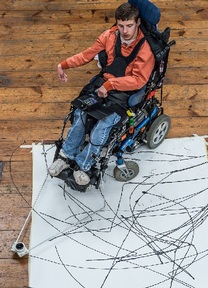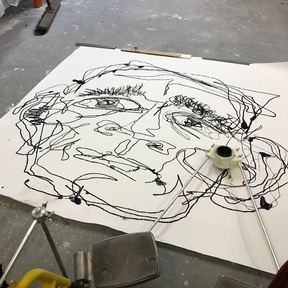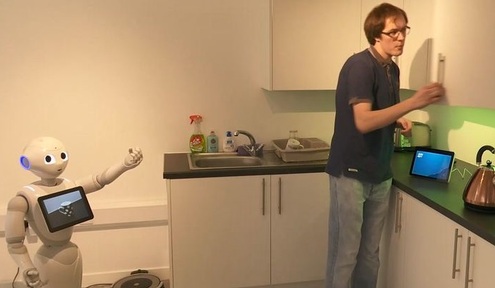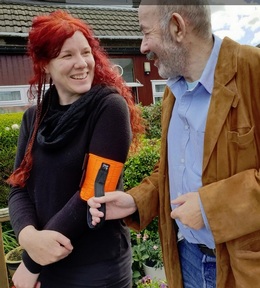Disability-friendly gadgets let blind harness public's sight and create wheelchair artists
Blind people can harness the power of other people’s vision via their phone, robots can give unobtrusive care and wheelchair users can create art, thanks to disability-friendly gadgets.

A gadget that lets paralysed people physically express their creativity by turning their wheelchair into an art-making tool is just one of the life-changing devices recognised in the Blackwood Design Awards (BDA), hosted by care provider Blackwood.
Inventors from around the world gave Dragon’s Den-style pitches about disability-friendly gadgets and ideas to BDA judges via Skype.
Two Brighton University students Eli Heath and Pete Barr created the Enayball, which attaches to a wheelchair and paints on the floor in front of a wheelchair user as they move. Enayball won the ‘Best New Concept’ award at the BDAs.

Pete Barr, co-creator of Enayball, said: “We firmly believe that art is a human right. Most products for people with disabilities are dull and utilitarian and we want to challenge that. We’re working towards having a finished product, ready for purchase and workshop use by the end of 2019.”
Judges were also impressed by the ‘Be My Eyes’ app which connects visually-impaired people with a sighted member of the public via a live video chat on their smartphone.
Anyone who downloads the app to their phone, can volunteer to lend their eyes to solve everyday tasks that blind and low-sighted people struggle with, such as checking food expiry dates or navigating new surroundings.
With over 2.1 million volunteers worldwide, the general public are being encouraged to download the app to their smartphones. They are then alerted if there is a visually-impaired person requesting assistance. The app has over 131,500 blind and low vision users.
Sally, a volunteer from Essex, said she watched her friend, who is also a volunteer use the phone app.
She said: "She had to help this person find a tablet. He had dropped all his tablets on the floor but he’d found a few, and there was just one more to find and she helped him find it pretty quickly.
“That seemed to be a fantastic idea that I could be handy for somebody else, and I could feel useful to somebody else all of a sudden.
“So, I could just talk to anybody in the world and they could use the one bit of my body that’s still working. It makes me feel really valued.
"I really look forward to my first call and all subsequent calls, because life is hard when you’re on your own.”
Used globally in more than 150 countries, the app won the ‘Best New Product’ category at the BDAs.
Robot used as 'live-in assessor'

Scott MacLeod and Heriot-Watt University won a BDA award after developing a system involving robots and sensors to help people with dementia and cognitive impairments receive less intrusive care.
The project used Pepper the robot, as a 'live-in assessor' for those in the early stages of dementia or neurological conditions.
Pepper asks the user to do tasks such as make a cup of tea and this allows for a prognosis by helping care staff, family and doctors to accurately assess an individual’s level of ability to live independently.
The system listens as the individual tells them what daily task they are carrying out and the robot monitors that the individual is doing it correctly and advises to do it differently, if they are not.
Mr MacLeod said: “All the user needs to say is ‘I’m making a cup of tea’, for example, and the robot will watch and flag up if they’ve picked up the salt instead of the sugar.
"We wanted to create something that didn’t disrupt a person’s day-to-day life and that meant that they could go on living independently for longer."
‘It takes that awkwardness away’
Gadgets on the BDAs shortlist included The Ramble Tag. Neighbours Laura Maclean and Tom Forsyth, live in Scotland and came up with The Ramble Tag while they were out walking their dogs.

Tom Forsyth is visually impaired and the pair found it a challenge as both neighbours have large dogs.
He said: “Even just as a guide and a visually impaired person, it’s so often the case that actually what you see is two people trying to walk as one. That makes it very awkward."
The Ramble Tag is a small harness for visually impaired people which is designed to be worn on a guide’s upper arm.
Mr Forsyth added: “It takes that awkwardness away from example asking a neighbour to walk, to take me out. I don’t have to hold their hand. I don’t have to wrap my arm around theirs."
The Blackwood International Design Award is hosted by Blackwood Homes and Care, which provides over 1,500 homes to people in Scotland as well as home care services.
Now in its sixth year, the BDAs supports the legacy of Dr Margaret Blackwood who dedicated her life to campaigning for the rights of people with disabilities.
The BDAs 2019/20 will be open to designers, engineers and inventors to submit entries later this year.
Latest News
 29-Jul-24
Dementia Bus gives carehome.co.uk staff insight into life with dementia
29-Jul-24
Dementia Bus gives carehome.co.uk staff insight into life with dementia
 27-Jul-23
UK's top home care agencies in 2023 revealed
27-Jul-23
UK's top home care agencies in 2023 revealed
 30-Nov-22
A quarter of older people keep their falls secret from family
30-Nov-22
A quarter of older people keep their falls secret from family
 29-Nov-22
'Covid-19 has not gone away' say terminally ill
29-Nov-22
'Covid-19 has not gone away' say terminally ill
 28-Nov-22
IT consultant who received poor care opens 'compassionate' home care business
28-Nov-22
IT consultant who received poor care opens 'compassionate' home care business